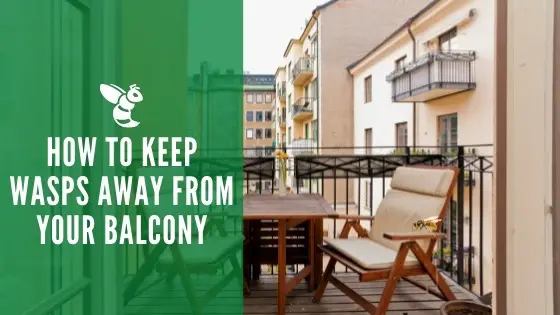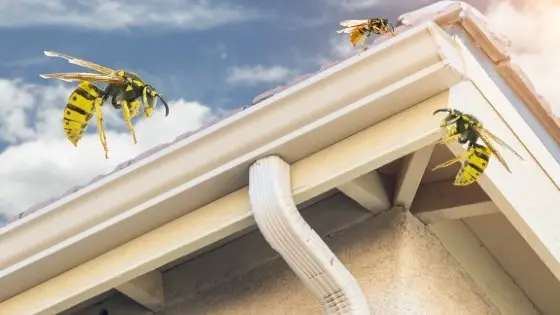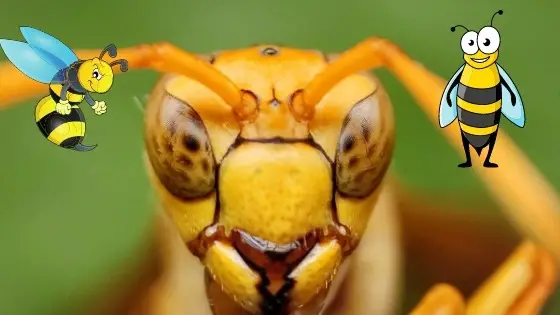Wasps in the Roof: How to Get Rid of Them
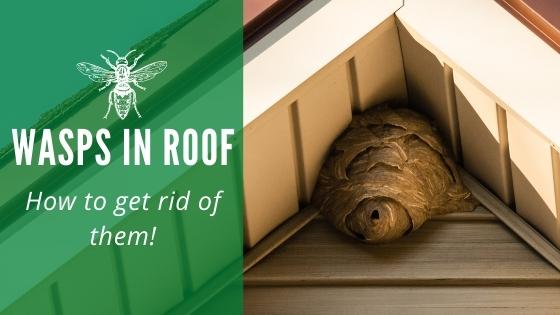
Wasp nests are something that you do not want around your home. They can become aggressive if you get too close to their nests. Unfortunately, they love the shelter of the eaves and attics of our homes. What should you do if you have a wasp nest near your home?
Can I Leave a Wasp Nest in My Roof?
If you have a wasp nest on your roof and you think the nest is empty, you should use caution. Many times, it is because you have used some method to kill the wasps. The danger is that not all of the wasps are dead. Many people are unaware that even wasps can sting for some time, even after they are dead.
Sometimes, there are a few survivors, even if you have used a chemical attack. This is why you should always use caution when removing a wasp nest, even in the middle of winter. You should not leave the wasp nest alone because if any eggs survive, the nest can start over. The nest can generate a new queen and start the cycle all over again.
Once you have taken action to kill the wasps, you should carefully remove the nest, even if it appears to be dead. Another colony will not take up residence in an old wasp nest. The only problem is if there are any survivors from the old colony. It is usually recommended that you leave the nest alone for two or three months before removing it to make sure they are all dead.
Can I Bomb My Attic for Wasps?
Wasps love the protected, warm environment of your attic. If you have wasps in the attic there are several things you can do about them. A couple of stray wasps might not seem like a problem at first, but they can soon become problematic when they begin building nests and reproducing.
Professional-grade pesticide bombs are available that are recommended for getting rid of wasps in the attic. Make sure to use them according to the directions on the package. Also, make sure to keep all pets and humans away from the area while the spray does its job. Do not enter the attic until the recommended time on the package has passed. These chemicals can be harmful to humans and pets if they are not used according to the directions.
If there is only one small nest, you might want to try a long-distance spray that is more easily controlled. You should always be careful when attempting to kill wasps in your attic because one small step can cause you to become injured. The last thing you want is to be trapped in an attic with a bunch of angry wasps.
How Do I Keep Wasps Out of My Attic?
An attic is an attractive place for wasps. It offers them shelter and an area to stay safe from predators. The insulation in the attic makes the perfect place for a nest.
Be aware that some wasps will eat wood so that they can be destructive. Also, sometimes, wasps will get into the walls and other areas of the home through the attic. If this happens, professional removal is often required.
The first step to keeping wasps out of your attic is to seal any cracks or crevices. You can use caulk or polyurethane foam to fill areas where they can get in. Do not seal your vent. Instead, you can purchase a piece of window screen and put it on the inside of your vents.
How Do You Keep Wasps from Building Nests Under Eaves?
Wasps love attics, and their second most favorite place is under the eaves of your house. Keeping them away from the eaves is more difficult than keeping them away from the attic because you cannot easily seal off the area. You can use some techniques to discourage wasps from nesting under your eaves that require only a few simple ingredients.
According to the Journal of Pest Management Science, a mixture of clove, geranium, and lemongrass essential oils successfully repelled wasps. You could mix a few drops of each into a spray bottle of water and apply it to the eaves of your home. You will need to apply it at least twice a month because the oils evaporate, and it will lose its effectiveness.
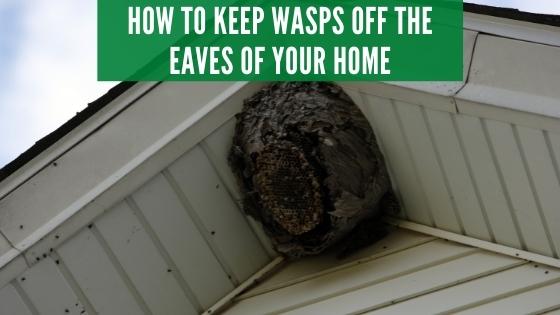
Peppermint oil is another method that has been shown to repel wasps. One of the easiest ways to repel wasps is with about two tablespoons of dish soap in a spray bottle of water. The soap clogs their breathing pores and will cause them to die in about a minute or two. You can also use this to spray the eaves of your house to prevent them from nesting. Just as with the other oils, you will have to reapply these often.
When looking for places to spray wasp repellent, be sure to include the eaves of the house, porch roofs, and under any ledges or crevices. If there have been areas where wasps have nested in the past, you should target those areas.
Also, if you see a wasp flying around looking for a place to nest, then you can spray the area, and most of the time they will leave. Be careful when spraying near a live wasp because it could become aggressive and call in a few friends for help.
How to Stop Wasps Getting Under Roof Tiles?
Another favorite home building site is under your roof tiles, especially damaged or curled ones. They look for the smallest cracks and holes that you might miss. One of their favorite places to enter is where the dormer roof meets the main roof or around the flashing. The problem with wasps in these areas is that they can often be inaccessible, and you might not have access to all of the nest areas, even with a spray.
Wasp killer powders and dusts are available that you can use to eliminate a difficult problem and keep them from returning in an area that is difficult to reach. This is a dangerous scenario and could involve you on a step ladder with a bunch of angry wasps. Dusts often do not penetrate the nests deeply enough, and it might take several applications to kill all of them.
It is usually best to call a more experienced professional when it comes to wasps on the roof or in roofing components. Professionals have the proper equipment and bee suits that allow them to deal with the issue safely. It is always better to be safe than sorry when dealing with wasps.
Wasps are a nuisance, and if you or any member of your family is allergic to them, they can be dangerous. Before attempting wasp removal from any part of your home, it is always best to assess the best way to handle the issue. When in doubt, this is one time when calling a professional might be your best option. The most important thing is not to wait because the problem will only get worse.
Sources
https://www.goodhousekeeping.com/home/a20706019/how-to-keep-wasps-away/
https://www.sciencedirect.com/topics/agricultural-and-biological-sciences/paper-wasp

